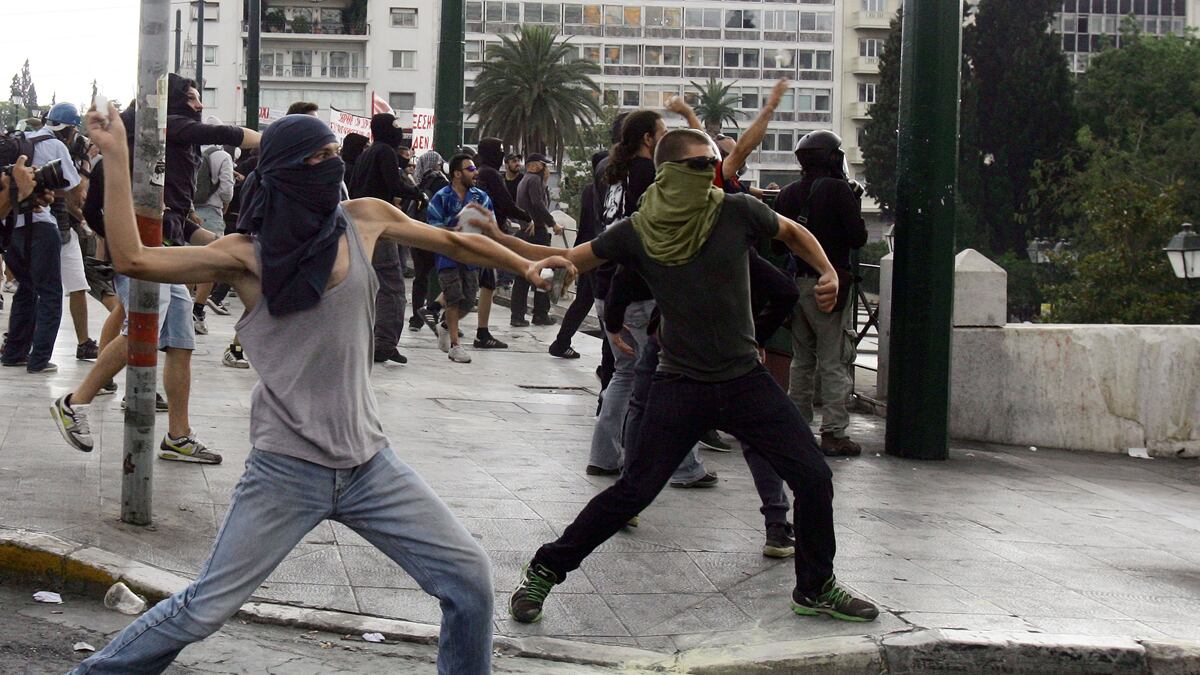For once, the joke’s not on the EU.
Despite a long and painful debt crisis that has spurred massive austerity protests across the continent, the European Union won the Nobel Peace Prize on Friday. In a short statement read from Oslo, Nobel committee president Thorbjoern Jagland acknowledged the “grave economic difficulties and considerable social unrest” plaguing EU members, but applauded the organization’s “successful struggle for peace and reconciliation and for democracy and human rights.” He explained, “The stabilizing part played by the EU has helped to transform most of Europe from a continent of war to a continent of peace.”

But the gags were more predictable than the winner. As 11 a.m. ticked closer in Oslo, winding down to the announcement of this year’s award, word of the surprise winner spread through social media on the back of jokes. Tweeters snickered about the sparring to come between European leaders over who would collect the prize in person on Dec. 10. And once the European Union snagged the win, they chided about the swag: $1.2 million in prize money, or .0027 euro per inhabitant according to one tweeted estimate. Not quite a bailout. They guffawed that the EU might get the peace prize, but never the Nobel for economics or, indeed, for chemistry.
Observers noted that Norway, home to the prestigious Nobel committee named by the country’s parliament, has itself twice voted “no” to joining the EU, in 1972 and 1994. And the prolific fake Angela Merkel, @Queen_Europe, a widely followed Twitter account spoofing the German Chancellor, mused, “Surely the EU should be winning the What the F*** Do We Do With Greece prize?"
Explaining the Nobel committee’s logic, Jagland read, “The dreadful suffering in World War II demonstrated the need for a new Europe. Over a 70-year period, Germany and France had fought three wars. Today, war between Germany and France is unthinkable.” He continued, “This shows how, through well-aimed efforts and by building up mutual confidence, historical enemies can become close partners.” Jagland suggested links between the EU and the end of authoritarian rule in Spain and Greece—nations that had to aspire to democracy before they could join, are both struggling under massive debt today. He credited the EU with bridging East and West, strengthening reconciliation in Balkan states at war as recently as the 1990s and now at various stages of joining the EU, and for advancing democracy and human rights in Turkey by opening a controversial possibility that it could someday earn membership.
Indeed, far from curious timing, the prize seems a concerted plea to put an organization heavily lampooned in the current economic crisis into long-haul perspective. In a word, the Norwegian sages appear to be asking, “What’s so funny 'bout peace, love, and understanding?"
After the EU’s surprise win, a phalanx of pertinent figures rushed—or competed, critics suggested—to comment. European Council President Herman Van Rompuy of Belgium told reporters in Helsinki of his pride in the prize, explaining, “Europe got through two civil wars in the 20th century and we have established peace thanks to the European Union. So the European Union is the biggest peacemaker in history.”
"Through this distinction, every European can take pride,” French President François Hollande said in a statement. “That of being a member of a union that was able to make peace between peoples that had long fought and to build a community founded on the values of democracy, liberty, and solidarity.” In France too, a visibly moved former European commissioner, Jacques Barrot, when asked for comment on the 24-hour newschannel i-Télé, couldn’t hold back tears.
Still, the so-called Euro-skeptics were out in full force. “This goes to show that the Norwegians really do have a sense of humor,” sniped Nigel Farage, who heads Britain’s U.K. Independence Party. “The EU may be getting the booby prize for peace because it sure hasn’t created prosperity.”
Fellow Briton Martin Callanan, who chairs the European Parliament’s Conservatives and Reformists Group, wasn’t laughing either. “The Nobel committee is a little late for an April Fool’s joke. Twenty years ago, the prize would have been sycophantic but maybe more justified,” he said. “Today it is downright out of touch. Presumably this prize is for the peace and harmony on the streets of Athens and Madrid.”
The French sovereigntist leader Nicolas Dupont-Aignan told BFMTV, “At first I thought it was a joke.” And far-right National Front spitfire Marine Le Pen said the Nobel committee had “completely discredited itself because the EU is not peace, it is war! It is economic war, it is a social war led against the peoples.” She fingered Europe’s current austerity campaigns and said the Nobel committee had shown “unbelievable cynicism with regard to the millions of Europeans who are suffering a thousand deaths from the policy led by the EU.”
Greece’s opposition Syriza party was similarly nonplussed. Spokesman Panos Skourletis told The Guardian newspaper’s Athens correspondent, “This decision cheapens the prize and more importantly harms the institution of the Nobel Peace award.” Skourletis added, “In many parts of Europe, but especially in Greece, we are experiencing what really is a war situation on a daily basis albeit a war that has not been formally declared. There is nothing peaceful about it.”
In Italy, Premier Mario Monti, himself a former EU commissioner, reacted by calling the EU’s “formula of [using] integration to stop war and guarantee peace ... the subject of study and admiration in other parts of the world.” But it wasn’t lost on observers that the thousands of student protesters taking to the streets in 90 Italian cities on Friday against austerity measures might well feel differently.
Meanwhile, the real Angela Merkel was predictably less flippant than her phony Twitter doppelgänger. The German chancellor on Friday called the Nobel tap “a wonderful decision.” “Six decades of peace in Europe, that is a long time for those of us who live in the EU, but from a historical point of view it is just the blink of an eye,” she said. “We must work tirelessly and continue to strive for peace, democracy and freedom.”
Indeed, the prize comes only days after Merkel was greeted by 50,000 angry Greek austerity protesters during a Tuesday visit to Athens, with 7,000 law-enforcement officers called on to protect the chancellor and avert violent unrest. Many Greeks blame healthier, wealthier Germany for the draconian austerity reforms Greece has had to sign on for, strict discipline promised in exchange for over 200 billion euros in EU-IMF bailout funds. Some protesters Tuesday in Athens were quick to liken Merkel to Adolf Hitler—brandishing swastikas and other Nazi paraphernalia—leading the mass-market German newspaper Bild to exclaim on its cover “Germany Does Not Deserve That.” In rewarding the EU on Friday, the Nobel committee appeared, precisely, to agree.






